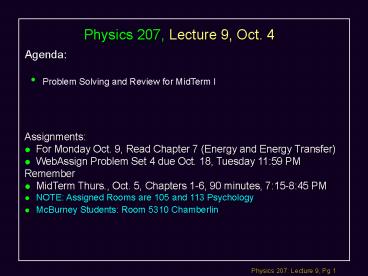Physics 207, Lecture 9, Oct' 4
Title:
Physics 207, Lecture 9, Oct' 4
Description:
... a force F. Find the tension in each segment of the rope and the magnitude of F. ... Assume the rope is massless. ... rope ... –
Number of Views:31
Avg rating:3.0/5.0
Title: Physics 207, Lecture 9, Oct' 4
1
Physics 207, Lecture 9, Oct. 4
- Agenda
- Problem Solving and Review for MidTerm I
- Assignments
- For Monday Oct. 9, Read Chapter 7 (Energy and
Energy Transfer) - WebAssign Problem Set 4 due Oct. 18, Tuesday
1159 PM - Remember
- MidTerm Thurs., Oct. 5, Chapters 1-6, 90 minutes,
715-845 PM - NOTE Assigned Rooms are 105 and 113 Psychology
- McBurney Students Room 5310 Chamberlin
2
Problem solving
3
Example with pulley
- A mass M is held in place by a force F. Find the
tension in each segment of the rope and the
magnitude of F. - Assume the pulleys are massless and
frictionless. - Assume the rope is massless.
- The action of a massless frictionless pulley is
to change the direction of a tension. - Here F T1 T2 T3
- Equilibrium means S F 0 for x, y z
- For example y-dir ma 0 T2 T3 T5 and ma
0 T5 Mg - So T5 Mg T2 T3 2 F ? T Mg/2
4
Lecture 9, Exercise 1
- You are going to pull two blocks (mA4 kg and
mB6 kg) at constant acceleration (a 2.5 m/s2)
on a horizontal frictionless floor, as shown
below. The rope connecting the two blocks can
stand tension of only 9.0 N. Would the rope
break ? - (A) YES (B) CANT TELL (C) NO
a 2.5 m/s2
rope
A
B
5
Lecture 9, Exercise 1
- You are going to pull two blocks (mA4 kg and
mB6 kg) at constant acceleration (a 2.5 m/s2)
on a horizontal frictionless floor, as shown
below. The rope connecting the two blocks can
stand tension of only 9.0 N. Would the rope
break ? - FBD for A
- Newtons 2nd Law x-dir ma F 4 kg x 2.5 m/s2
10 N - (A) YES (B) CANT TELL (C) NO
a 2.5 m/s2
rope
A
B
6
ExampleProblem 5.40 from Serway
- Three blocks are connected on the table as shown.
The table has a coefficient of kinetic friction
of mK0.40, the masses are m1 4.0 kg, m2 1.0
kg and m3 2.0 kg.
m2
T1
m1
m3
(A) What is the magnitude and direction of
acceleration on the three blocks ? (B) What is
the tension on the two cords ?
7
Problem 5.40 from the book
- Three blocks are connected on the table as shown.
The table has a coefficient of kinetic friction
of mK0.40, the masses are m1 4.0 kg, m2 1.0
kg and m3 2.0 kg.
N
m2
T1
T1
T3
m1
m2g
m1g
m3
m3g
(A) FBD (except for friction) (B) So what about
friction ?
8
Problem 5.40 recast as 1D motion
- Three blocks are connected on the table as shown.
The center table has a coefficient of kinetic
friction of mK0.40, the masses are m1 4.0 kg,
m2 1.0 kg and m3 2.0 kg.
N
m3g
m1g
T3
T1
m3
m1
m2
ff
frictionless
frictionless
m2g
m1g gt m3g and m1g gt (mkm2g m3g) and friction
opposes motion (starting with v 0) so ff is to
the right and a is to the left (negative)
9
Problem 5.40 recast as 1D motion
- Three blocks are connected on the table as shown.
The center table has a coefficient of kinetic
friction of mK0.40, the masses are m1 4.0 kg,
m2 1.0 kg and m3 2.0 kg.
N
m3g
m1g
T1
T1
T3
T3
m3
m1
m2
ff
frictionless
frictionless
m2g
x-dir 1. S Fx m2a mk m2g - T1 T3
m3a m3g - T3 m1a - m1g T1
Add all three (m1 m2 m3) a mk m2g m3g
m1g
10
Forces at different angles
- Case1 Downward angled force with friction
- Case 2 Upwards angled force with friction
- Cases 3,4 Up against the wall
- Questions Does it slide?
- What happens to the normal force?
- What happens to the frictional force?
Cases 3, 4
Case 2
Case 1
ff
F
F
N
N
N
F
ff
ff
mg
mg
mg
11
Forces at different angles
- Identify forces pairs
- Make a Force Body Diagram
- Choose directions for x, y and z axes
- Write down Newtons 2nd Law for the x, y and z
directions - If no acceleration sum of the forces is zero, ma
otherwise
Cases 3, 4
Case 2
Case 1
ff
F
F
N
N
N
q
F
q
ff
ff
mg
mg
mg
12
Normal Forces and Frictional Forces
- At first the velocity is v up along the slide
- Can we draw a velocity time plot?
- What the acceleration versus time?
Normal means perpendicular
Normal Force
Friction Force Sliding Down
fk Sliding Up
v
q
q
mg sin q
Weight of block is mg
Friction Force Normal Force ? (coefficient of
friction) Ffriction ? Fnormal m mg sin q































